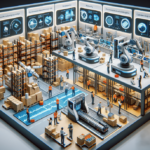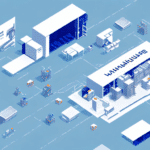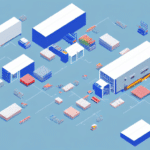Locus Robotics vs Knapp: Comprehensive Comparison of Warehouse Automation Solutions
Warehouse automation has become a critical investment for businesses aiming to optimize their operations. With the surge in e-commerce deliveries, automation is no longer a luxury but a necessity. Two prominent players in this market are Locus Robotics and Knapp. This article delves into the history, competitive landscape, features, target markets, case studies, pricing, and future outlook of these companies to help you determine which solution best fits your business needs.
Introduction to Locus Robotics and Knapp
Locus Robotics is an American-based company specializing in autonomous robots designed to enhance productivity in warehouse operations. Their robots automate tasks such as picking and transporting packages, thereby reducing costs, minimizing errors, and speeding up delivery times. Additionally, these robots improve accuracy, efficiency, and safety within warehouse environments.
Knapp, headquartered in Austria, offers advanced software and automation systems tailored for warehouses, distribution centers, and airports globally. As a leader in material handling and intralogistics solutions, Knapp provides automated storage, sorting, and processing systems that streamline operations and enhance overall efficiency.
Founded in 2014, Locus Robotics has partnered with major retailers like DHL, GEODIS, and CEVA Logistics. Their robots are equipped with sophisticated sensors and algorithms that allow seamless navigation through complex warehouse settings and collaboration with human workers. Furthermore, these robots integrate effortlessly with existing warehouse management systems, facilitating smooth adoption of automation technologies.
Knapp boasts over 70 years in the industry with a strong emphasis on sustainability and energy efficiency. Their innovative solutions, such as the OSR Shuttle™ Evo, a high-speed automated storage and retrieval system, can handle up to 1,000 operations per hour. Knapp's software enables real-time tracking and monitoring of warehouse activities, promoting better decision-making and resource optimization.
History of Locus Robotics and Knapp
Locus Robotics
Locus Robotics was established in 2014 by Bruce Welty, an e-commerce entrepreneur and serial tech investor. The company has rapidly grown to become a leading provider of autonomous mobile robots in the United States, employing over 100 staff and serving more than 50 customers with over 25 million units picked to date.
Knapp
Knapp has a rich history dating back to 1952, founded by Gunter and Christoph Knapp. Over the decades, Knapp has expanded significantly, offering unique automation solutions to businesses worldwide. Today, the company employs over 7,700 people across 40 subsidiaries globally.
Strategic Partnership
Despite their different founding years, Locus Robotics and Knapp have forged a strategic partnership that leverages their respective strengths. This collaboration has led to the development of innovative technologies that have transformed the logistics industry, enhancing efficiency and cost-effectiveness while expanding their global reach.
Competitive Landscape for Warehouse Automation Solutions
The global warehouse automation market is intensely competitive, featuring a variety of players offering diverse solutions. Key competitors include Honeywell, Kuka, Amazon Robotics, and Swisslog. However, Locus Robotics and Knapp are emerging as frontrunners due to their advanced technologies, proven performance, and excellent customer feedback.
Key Competitive Factors
- Rising Demand for Efficiency: The explosion of e-commerce has heightened the need for rapid and accurate order processing, driving businesses to invest in automation.
- Advancements in AI and Machine Learning: Incorporating artificial intelligence (AI) and machine learning (ML) into warehouse operations enhances process optimization, inventory management, and customer satisfaction.
- Integration Capabilities: Solutions that seamlessly integrate with existing systems are highly sought after, as they reduce the complexity and cost of implementation.
Tech giants like IBM, Google Cloud, and Microsoft Azure are also developing AI and ML solutions tailored for warehouse automation, further escalating competition.
Comparison of Locus Robotics and Knapp Technologies
Locus Robotics Technologies
Locus Robotics offers autonomous mobile robots that collaborate with warehouse staff to boost productivity, speed, and accuracy in picking and transporting packages. These robots are equipped with sensors, algorithms, and AI to navigate warehouses with minimal supervision.
Knapp Technologies
Knapp, conversely, provides a suite of automated storage, sorting, and processing systems characterized by their flexible, modular designs, high throughput, and customizability. Knapp's technologies are designed for full automation, requiring minimal human intervention.
Key Differences
- Collaboration vs. Automation: Locus Robotics emphasizes collaborative robots that complement human workers, making them ideal for environments where human-robot interaction is essential. Knapp focuses on fully automated systems, suitable for larger and more complex operations that can benefit from minimal human involvement.
- Scalability: Locus Robotics is particularly well-suited for small to medium-sized warehouses, offering scalability based on business needs. Knapp's solutions are more tailored for sizable operations that require extensive customization and flexibility.
The choice between Locus Robotics and Knapp Technologies ultimately depends on a business's specific operational requirements, size, and automation goals.
Features and Benefits of Locus Robotics Solutions
Key Features
- Autonomous Navigation: Equipped with advanced sensors and AI algorithms for seamless movement within warehouses.
- Real-Time Data Analytics: Provides actionable insights into inventory levels, order processing times, and key performance metrics.
- Seamless Integration: Compatible with existing warehouse management systems to ensure smooth implementation.
Benefits
- Increased Productivity: Robots enable faster order processing and higher pick rates.
- Enhanced Accuracy: Automation reduces human errors, ensuring more accurate order fulfillment.
- Scalability: Solutions can be scaled up or down based on business demands.
- Space Efficiency: Robots navigate tight spaces, reducing the need for expansive warehousing facilities.
- Safety: Automation minimizes the risk of workplace injuries by handling repetitive or hazardous tasks.
Additionally, Locus Robotics provides real-time data analytics and reporting, allowing businesses to monitor inventory levels, order processing times, and other key metrics. This data-driven approach facilitates informed decision-making, process optimization, and identification of operational bottlenecks.
Features and Benefits of Knapp Solutions
Key Features
- Automated Storage and Retrieval: High-speed systems like the OSR Shuttle™ Evo handle up to 1,000 operations per hour.
- Real-Time Tracking: Enables continuous monitoring of warehouse activities for better management.
- Modular Design: Flexible and customizable systems that can adapt to various operational needs.
Benefits
- Higher Throughput: Automated systems can handle a large volume of operations efficiently.
- Increased Storage Capacity: Optimized storage solutions maximize warehouse space utilization.
- Efficient Logistics Processing: Streamlined processes reduce processing times and enhance accuracy.
- Modularity and Customizability: Systems can be reconfigured to meet specific business needs.
- Sustainability: Energy-efficient technologies and materials help businesses achieve sustainability goals and reduce carbon footprints.
Knapp's solutions also offer real-time visibility into inventory levels and order statuses, enabling proactive inventory management and swift response to demand fluctuations.
Target Markets for Locus Robotics and Knapp
Locus Robotics Target Markets
Locus Robotics primarily targets businesses involved in e-commerce operations, including retailers, e-commerce companies, and third-party logistics providers. Their technology is ideal for organizations seeking efficient and accurate order processing, rapid shipping, and high inventory accuracy.
Knapp Target Markets
Knapp caters to a broader range of logistics operations, including those handling FDA-regulated products, fashion items, and general retail. Their modular and scalable solutions are designed to meet the diverse needs of various industries.
Healthcare and Pharmaceutical Sectors
- Healthcare: Locus Robotics enhances order fulfillment and inventory management for medical supplies and equipment.
- Pharmaceuticals: Knapp ensures compliance with strict regulations and secure handling of sensitive products through its automated systems.
Case Studies: Successful Implementations of Locus Robotics and Knapp Solutions
Locus Robotics Implementations
- DHL Supply Chain: Incorporated Locus robots, resulting in a 33% increase in productivity and reduced training time for new employees.
- GEODIS: Achieved a 70% increase in pick rates after implementing Locus Robotics solutions.
- Quiet Logistics: Experienced a 50% productivity boost and a 20% reduction in labor costs, along with decreased errors in order fulfillment.
Knapp Implementations
- Radial: Leveraged Knapp's Order Fulfillment System, achieving a 45% increase in overall order fulfillment and improved inventory management.
- University of Kansas Health System: Implemented Knapp's automated storage and retrieval system, enhancing inventory management and reducing retrieval times, thereby improving patient care and lowering costs.
Customer Reviews: Feedback from Companies Using Locus Robotics and Knapp
Customers of both Locus Robotics and Knapp have reported substantial improvements in their operations:
- Productivity: Notable increases in order processing rates and overall warehouse efficiency.
- Cost Reduction: Lower operational costs due to automation of labor-intensive tasks.
- Flexibility and Scalability: Solutions adapt to varying business sizes and demands without significant overhauls.
- User-Friendliness: Intuitive interfaces and minimal training requirements facilitate smooth integration and usage.
Overall, businesses appreciate the reliability and effectiveness of these automation systems in transforming traditional warehouse operations.
Pricing Comparison for Locus Robotics vs Knapp
The pricing of automation solutions from Locus Robotics and Knapp varies based on several factors, including warehouse size, employee count, and order volume. Generally:
- Locus Robotics: Offers a more affordable option due to its straightforward design and scalability, making it suitable for small to medium-sized warehouses.
- Knapp: Tends to be more expensive, reflecting its high level of customizability and flexibility, which is ideal for large-scale and complex operations.
For accurate pricing tailored to your specific needs, it is recommended to contact the companies directly or request a detailed quote on their official websites.
Future Outlook for Warehouse Automation with Locus Robotics and Knapp
The future of warehouse automation with Locus Robotics and Knapp looks promising, driven by the increasing global demand for efficient automation solutions. Key trends and projections include:
- Growth in E-commerce: Continued expansion of online shopping will drive further investment in warehouse automation.
- Technological Advancements: Innovations in AI, machine learning, and robotics will enhance the capabilities and efficiency of automation systems.
- Expansion into New Sectors: Beyond traditional warehousing, automation technologies may find applications in healthcare logistics, automotive manufacturing, and pharmaceuticals.
- Sustainability Focus: Emphasis on energy-efficient and eco-friendly solutions will influence future developments and adoption rates.
Both Locus Robotics and Knapp are well-positioned to capitalize on these trends, continuing to deliver cutting-edge technologies that meet the evolving needs of businesses worldwide.
Conclusion: Which Solution is Right for Your Business?
Choosing between Locus Robotics and Knapp depends largely on your business's specific requirements and operational goals:
- Locus Robotics: Best suited for businesses focused on e-commerce operations seeking a cost-effective, scalable, and user-friendly automation solution that collaborates with human workers.
- Knapp: Ideal for larger, more complex warehouses requiring highly customizable and flexible automation systems with minimal human intervention.
Consider factors such as scalability, ease of integration, return on investment, and the specific demands of your industry when making your decision. Both companies offer robust solutions that can significantly enhance warehouse efficiency and productivity, ensuring your business stays competitive in an increasingly automated world.




















